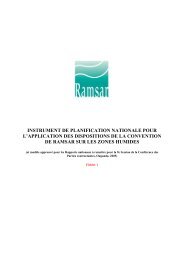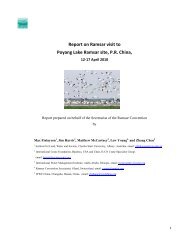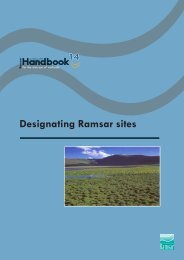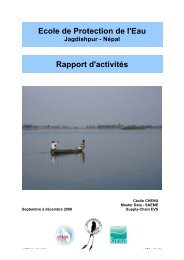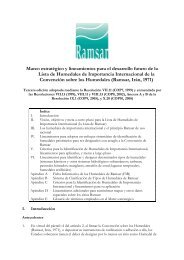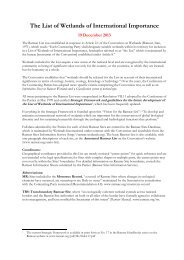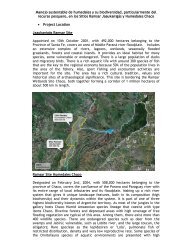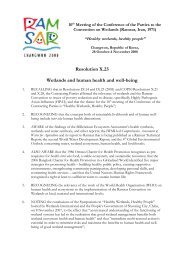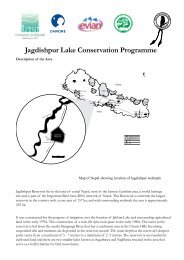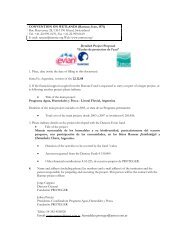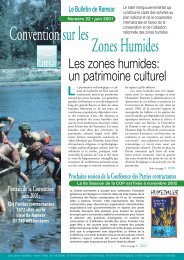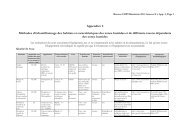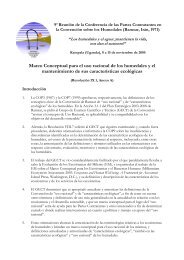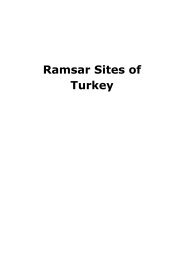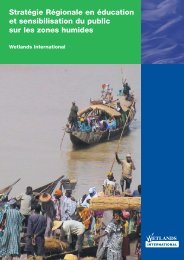Okavango Delta Management Plan - Ramsar Convention on Wetlands
Okavango Delta Management Plan - Ramsar Convention on Wetlands
Okavango Delta Management Plan - Ramsar Convention on Wetlands
You also want an ePaper? Increase the reach of your titles
YUMPU automatically turns print PDFs into web optimized ePapers that Google loves.
1.6.3.1 Project Design Phase<br />
Following Botswana’s accessi<strong>on</strong> to the <str<strong>on</strong>g>Ramsar</str<strong>on</strong>g> <str<strong>on</strong>g>C<strong>on</strong>venti<strong>on</strong></str<strong>on</strong>g> in 1997, the Department of<br />
Envir<strong>on</strong>mental Affairs (DEA) (formerly Nati<strong>on</strong>al C<strong>on</strong>servati<strong>on</strong> Strategy Coordinating Agency,<br />
(NCSA) through the support of the <str<strong>on</strong>g>Ramsar</str<strong>on</strong>g> Bureau commissi<strong>on</strong>ed a design missi<strong>on</strong>, which<br />
detailed a proposal for the development of a management plan for the <str<strong>on</strong>g>Okavango</str<strong>on</strong>g> <str<strong>on</strong>g>Delta</str<strong>on</strong>g> in<br />
2001 (HOORC, et al, 2001). A parallel exercise to formulate the Nati<strong>on</strong>al <strong>Wetlands</strong> Policy<br />
and Strategy was also initiated.<br />
The proposal identified the key management issues, formulated objectives, outlined project<br />
activities and funding requirements. This was followed by a situati<strong>on</strong>al analysis which<br />
entailed informati<strong>on</strong> gathering, review of existing literature and stakeholder c<strong>on</strong>sultati<strong>on</strong>s.<br />
200 issues were identified, clustered into thematic areas and developed into major project<br />
comp<strong>on</strong>ents (HOORC, et. al, 2001). This process was followed by an appraisal missi<strong>on</strong> in<br />
2001 to determine the adequacy of the proposal, c<strong>on</strong>firm management issues and<br />
recommended a “hot spots approach” to deal with priority issues to be addressed under the<br />
ODMP planning (Appraisal Missi<strong>on</strong> Debriefing Notes, 2001).<br />
1.6.3.2 Incepti<strong>on</strong> Phase<br />
Stakeholder buy-in was key at the initial planning stages of the ODMP. The process made a<br />
deliberate effort to c<strong>on</strong>sult and allow for feedback to c<strong>on</strong>firm and prioritise issues identified<br />
during the design phase.(ODMP – Incepti<strong>on</strong> Report, 2005).<br />
The various stakeholders were engaged as individual groups through the different fora<br />
which, culminated in a multi-stakeholder workshop which was held in November, 2004 and<br />
a report <strong>on</strong> the proceedings was produced (ODMP – Incepti<strong>on</strong> Report Workshop<br />
Proceedings, 2004). Drawing from the stakeholder analysis that was carried out during the<br />
ODMP planning, the stakeholder c<strong>on</strong>sultati<strong>on</strong> took an approach which engaged different<br />
stakeholder groupings as outlined below.<br />
Community engagement<br />
The community stakeholders were engaged through a series of kgotla meetings and<br />
workshops. In November and December 2003 and February and March 2004, 33 kgotla<br />
meetings were held in most of the major villages in and around the <str<strong>on</strong>g>Delta</str<strong>on</strong>g>. Detailed reports<br />
<strong>on</strong> the issues and their prioritizati<strong>on</strong> as well as analysis of the c<strong>on</strong>sultative processes were<br />
produced to guide the planning process in determining the areas which need management<br />
interventi<strong>on</strong>s (ODMP – Community C<strong>on</strong>sultati<strong>on</strong> and Feedback Report, 2004, ODMP –<br />
Analysis of the Participatory Process of the <str<strong>on</strong>g>Okavango</str<strong>on</strong>g> <str<strong>on</strong>g>Delta</str<strong>on</strong>g> <str<strong>on</strong>g>Management</str<strong>on</strong>g> <str<strong>on</strong>g>Plan</str<strong>on</strong>g>, 2004).<br />
Private sector engagement<br />
In January 2004, a special meeting dedicated to representatives of the private tourism<br />
sector was organised and held in Maun. From the 120 invitati<strong>on</strong>s sent out, approximately<br />
60 different companies comprised of 81 representatives attended reflecting the high level of<br />
interest from the tourism sector in the project. The meeting was structured in a similar way<br />
to the kgotla meetings although in this instance members of the Project Secretariat made<br />
presentati<strong>on</strong>s not <strong>on</strong>ly <strong>on</strong> the project as a whole but also <strong>on</strong> each individual comp<strong>on</strong>ent.<br />
There was again an extensive questi<strong>on</strong> and answer sessi<strong>on</strong> and representatives were given<br />
an opportunity to raise issues and c<strong>on</strong>cerns and make suggesti<strong>on</strong>s. These were captured in<br />
a report (ODMP – Private Sector Workshop Proceedings, 2004).<br />
Instituti<strong>on</strong>al engagement<br />
Direct c<strong>on</strong>sultati<strong>on</strong>s were undertaken by the Project Secretariat with local NGOs,<br />
government offices and many other instituti<strong>on</strong>s in the district, including both those directly<br />
8



